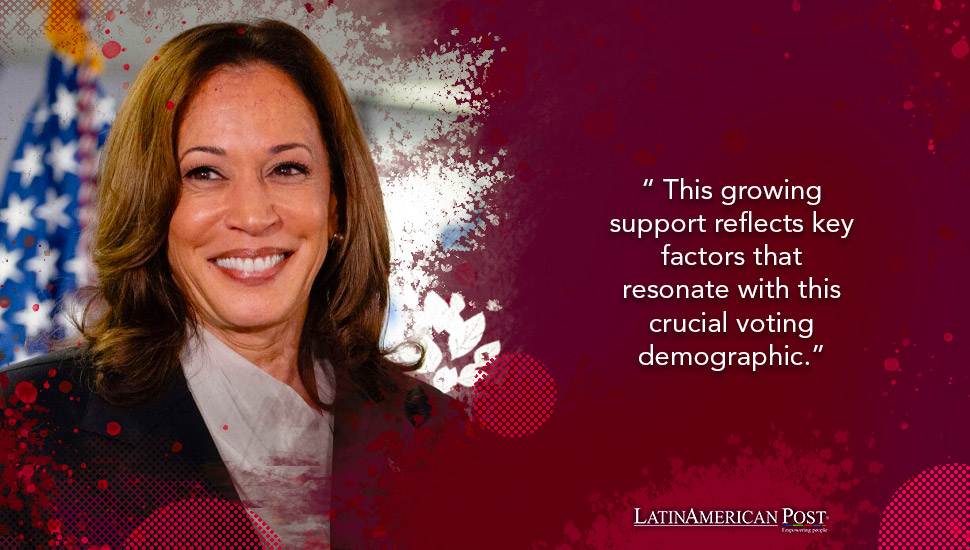Why is Kamala Harris Gaining Momentum Among Hispanic Voters?

Since announcing her candidacy for the 2024 presidential race, Vice President Kamala Harris has seen a significant surge in support from Hispanic voters. This growing support reflects key factors that resonate with this crucial voting demographic.
As evidenced by recent polling data, Kamala Harris’ candidacy has marked a turning point for Hispanic voters in the 2024 presidential race. The Economist and YouGov poll from August 2024 shows Harris holding a substantial 20-point lead over her Republican rival, former President Donald Trump, among Hispanic voters. This lead represents a dramatic increase from the early days of her campaign when her advantage was just 6 points.
So, what accounts for this significant shift in favor of Harris? One primary reason is Harris’ ability to connect with Hispanic voters on issues that directly impact their lives. Her focus on immigration reform, healthcare access, and economic opportunity speaks to the concerns of many in the Hispanic community. Harris has consistently emphasized her commitment to addressing these issues, positioning herself as a candidate who understands Hispanic Americans’ unique challenges.
Another critical factor is Harris’ visibility and engagement with Hispanic voters. Unlike her opponents, Harris has made a concerted effort to engage with Hispanic communities through town halls, roundtable discussions, and Spanish-language media appearances. This outreach has helped her build trust and rapport with voters who may have felt overlooked in previous elections. Her ability to speak directly to the concerns of Hispanic voters, combined with her background as the daughter of immigrants, has resonated deeply with this demographic.
Harris’ Appeal Amid Shifting Political Dynamics
Harris’s recent gains among Hispanic voters also reflect broader political dynamics at play. In recent years, Republicans have made inroads with Hispanic voters, particularly in key swing states like Florida and Texas. However, Harris’ candidacy appears to have halted this trend, at least for now. Her significant lead over Trump in battleground states such as Arizona, Nevada, and Georgia indicates that Hispanic voters are rallying behind her in a way they had not done for Biden earlier in the year.
One reason for this shift could be the growing recognition among Hispanic voters of the stakes in the 2024 election. Many voters are acutely aware of the election’s potential impact on issues like immigration, healthcare, and voting rights. Harris’s campaign has successfully framed these issues as existential for the Hispanic community, contrasting her vision with Trump’s record on these matters.
Furthermore, Harris’ ability to articulate a vision for the future that includes all Americans, regardless of race or ethnicity, has helped her gain traction with voters who may have been skeptical of the Democratic Party’s commitment to their concerns. Her inclusive message, coupled with her focus on policy solutions that directly address the needs of Hispanic families, has resonated strongly with voters looking for a leader who will fight for them.
Harris’ Success Reflects Broader Trends in the Democratic Party
The increasing support for Harris among Hispanic voters is not an isolated phenomenon; it reflects broader trends within the Democratic Party. The party has made a concerted effort to engage with Hispanic voters in recent years, recognizing their growing influence in American politics. The success of candidates like Harris demonstrates the effectiveness of this strategy.
Harris’s success also highlights the importance of coalition-building in modern American politics. By bringing together a diverse coalition of voters, including Hispanics, African Americans, and young people, Harris positions herself as a candidate who can unite the country. This coalition-building approach is crucial in an era of polarized politics, where bringing together disparate groups of voters is critical to winning elections.
Harris’s ability to connect with Hispanic voters also speaks to the importance of authenticity in politics. Voters are increasingly looking for genuine and relatable candidates, and Harris has succeeded in presenting herself as a leader who understands the struggles of everyday Americans. Her personal story and her policy positions have helped her build a strong connection with Hispanic voters that could prove decisive in the 2024 election.
Challenges and Opportunities Ahead
Despite the gains Harris has made among Hispanic voters, challenges remain. The Hispanic community is not monolithic, and there are significant differences in political preferences among different population segments. For example, while Harris has made substantial gains with Mexican-American voters, she may face challenges in winning over Cuban-American voters in Florida, who have traditionally leaned more conservative.
Moreover, while Harris’ lead among Hispanic voters is impressive, it is not insurmountable. Trump has shown an ability to connect with Hispanic voters in certain regions, particularly among those who prioritize issues like the economy and law enforcement. Harris must continue her outreach efforts and focus on issues that resonate with Hispanic voters to ensure her lead holds.
The road ahead for Harris is filled with both opportunities and challenges. Her growing support among Hispanic voters is a positive sign for her campaign, but she must continue building on this momentum to secure victory in November. As the 2024 election approaches, Harris’ ability to maintain and expand her lead among Hispanic voters will be a critical factor in determining the race’s outcome.
The Importance of Hispanic Voters in 2024
The increasing support for Kamala Harris among Hispanic voters underscores the importance of this demographic in the 2024 election. As the fastest-growing voting bloc in the United States, Hispanic voters have the potential to swing the outcome of the election in key battleground states. Harris’s ability to connect with these voters, address their concerns, and present a compelling vision for the future will be critical to her success in the 2024 race.
Harris’ growing lead among Hispanic voters highlights the importance of inclusive and representative leadership in American politics. As the country becomes more diverse, candidates who can build broad coalitions of support across different racial and ethnic groups will have a significant advantage. Harris’s success in this regard reflects her ability to navigate the complexities of modern American politics and position herself as a leader who can unite the country.
Also read: Strengthening Ties: U.S.-Latin America Integration for Mutual Benefit
Ultimately, the 2024 election will test whether Harris can maintain her momentum and expand her support among Hispanic voters and other key demographics. If she succeeds, she could become the first woman of color to be elected president of the United States. This historic achievement would mark a new chapter in American politics.





